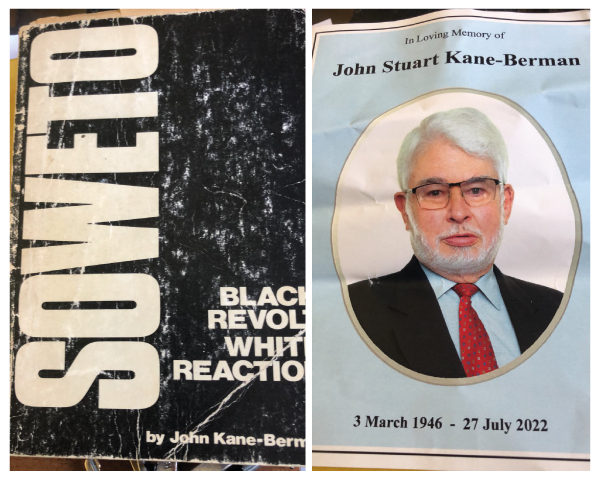I went this morning to the funeral of John Kane-Berman (76).
Besides being for some 31 years the CEO of the IRR ([SA] Institute of Race Relations) and a “fearless proponent of liberalism before, during, and after SA's democratic transition,” he was for many years a columnist here on Politicsweb.
There are (at least) two very fine obituaries of JKB – one, written by “the IRR,” was published on Politicsweb on 27 July – and another by J Brooks Spector on 31 July in the Daily Maverick. Perhaps needless to say, these – and the others – are very much worth reading.
This morning’s funeral was held at St George’s Anglican Church in Parktown. I reached there just a minute before the service began and – given that, as often happens, many people congregated towards the back of the church [i] – I headed for the front so I could find a seat; and I left immediately when the service ended.
So I wasn’t able to get a good look at the many people present [ii]. But I did catch a glimpse of some – and can safely say that many of Johannesburg’s leading “liberals” (for want of a better term) and others of a similar persuasion were there to pay their respects.
This was of course as it should have been; as the IRR obituary put it, JKB “devoted his life to vigorously opposing the race nationalism of apartheid’s ideologues and, at their defeat, the illiberal impulses of their successors”.
I still have my tattered copy of JKB’s book about the 1976 Soweto uprising, Soweto: Black Revolt, White Reaction (Ravan Press, 1978, cover design by Jackie Bosman, proofreading by Pat Schwartz [Tucker][iii]) – which I considered (and consider) to be one of the best local books ever of political reportage and analysis. I still know off by heart the final paragraph of the Preface:
“My greatest debt is to fellow-journalists, reporters and photographers alike, on various newspapers [iv]. Often at personal risk or cost, they told the story of what happened in Soweto. Some of them saw their newspapers closed down, others are still in detention as this book goes to the printers. They brought honour to their profession. Without them, this book could not have been written.”
When I first read this book, I was then just getting going as a journalist and that paragraph filled me with enormous pride; it still does.

This morning, having reached the front pews, I discovered that the seat just behind the one I took was reserved for 94-year-old Prince Mangosuthu Buthelezi who, it was later announced, had very much wanted to be at the funeral but had fallen ill so couldn’t make it.
This reminded me that I first met JKB 40 years ago, towards the end of 1981, when Stephen Mulholland had just been appointed editor of the Financial Mail (FM) and I (very much a junior) had gone there to work in the production department.
JKB was then an assistant editor or perhaps chief assistant editor of the FM. He had previously thrived as a labour and political journalist under the aegis of former editors George Palmer and (if I have this right) Graham Hatton. But JKB obviously seemed to feel (and possibly the feeling was mutual) that he wouldn’t be “comfortable” at the FM with Mulholland at the helm.
I mention this because, if I recall correctly – given that Mulholland was an unabashed Friedmanite and also made it very clear that in his view the FM would predominantly deal with finance, economics and business, not politics and labour – the general “view” among younger journalists (all mostly lefties) was that the “tension” between the two men somehow represented a “left vs. right” struggle.
Yet at the same time there was much vindictive gossip aimed by those younger journalists at JKB, including some calling him “right wing” – largely because of his refusal to condemn Buthelezi and the Inkatha Freedom Party. But JKB remained steadfast.
Ah yes, old gossip, old arguments, none of which matter anymore and certainly didn’t matter this morning.
JKB and I saw each other from time to time over the years and for the last time at the Constitutional Court launch of Justice Edwin Cameron’s Justice: A Personal Account in, it must have been, 2014.
Then in 2019, we crossed pens (as it were). JKB took umbrage at my review of Anthea Jeffery’s People’s War: New Light on the Struggle for South Africa – in which I had taken umbrage at Jeffery and JKB for “whacking the local media [of the nineties] retrospectively”.
But here’s the thing. If the subject were Jeffery’s book and the work of those journalists, I’d probably write or say (more or less) the same thing today; and JKB would doubtless do so too.
But if I’d had the opportunity of coming across JKB in recent months, there is something else I would have discussed with him.
It relates to the quote in the fifth paragraph of this article: JKB “devoted his life to vigorously opposing the race nationalism of apartheid’s ideologues and, at their defeat, the illiberal impulses of their successors”.
And it relates in particular to the last six words of the quote: the illiberal impulses of their successors.
I’d say this: JKB, all I can say to you now, in 2022, is that you’ve had it spot-on all along. You called it right, as they say. The impulses of the “successors” have turned out to be a lot more than impulses – and far, far worse than illiberal. They’re appalling and terrifying – and have ripped this place that we like so much into shreds.
[i] I always think it’s a hangover from one’s schooldays, where if you seat yourself at the front of the class, the teacher might ask you a question, or your friends might think you’re a creep.
[ii] Journalists are notoriously bad at numbers, but I’d guess from 100 to 150 people.
[iii] Peter Randall, co-founder of Ravan, was to have been the book’s editor, but he was banned on 19 October 1977.
[iv] JKB was referring to Gabu Tugwana, Zwelakhe Sisulu, Peter Magubane, Jon Qwelane, and many, many others.

